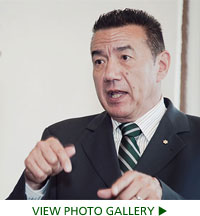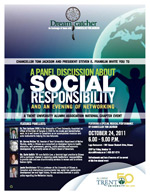
 |
  Trent Chancellor Tom Jackson Delivers Dynamic Community Workshop on Water MattersThursday, April 08, 2010 More than 100 Guests Attend Inaugural Event in New Dreamcatcher Series View Photo Gallery of Event Community empowerment, creative problem-solving, traditions and communication were prominent themes in a two-hour community workshop called Water Matters: Protecting, Conserving and Sharing Our Water hosted by Trent University chancellor Dr. Tom Jackson on April 5 at the Camp Kawartha Environment Centre located on Trent’s Symons campus. Community empowerment, creative problem-solving, traditions and communication were prominent themes in a two-hour community workshop called Water Matters: Protecting, Conserving and Sharing Our Water hosted by Trent University chancellor Dr. Tom Jackson on April 5 at the Camp Kawartha Environment Centre located on Trent’s Symons campus.In commenting on his new role as chancellor, Dr. Jackson said, "One of the reasons I took on this wonderful position is that I'm determined to protect our future – in the health and well-being of our young people." The workshop was the inaugural event in the new Dreamcatcher series, an exchange of ideas with Chancellor Tom Jackson. Over 100 special guests were in attendance including founding Trent president Professor T.H.B Symons, Peterborough Mayor Paul Ayotte and City of Kawartha Lakes Mayor Ric McGee, and community members along with Trent faculty, staff, students and alumni. University president Dr. Steven E. Franklin was on hand to welcome Dr. Jackson and all attendees to Trent. Panel of Experts Share Experiences and Advice Facilitated by Dr. Jackson, the by-invitation-only workshop featured a panel of experts, including: • Dr. Chris Metcalfe, professor of Environmental & Resource Studies and director of the Institute for Watershed Science at Trent University; • Dr. Brent Wootton, director and senior scientist for the Centre for Alternative Wastewater Treatment (CAWT) at Fleming College in Lindsay; • Shirley Williams, Aboriginal elder and professor emeritus of Indigenous Studies at Trent; and • Henry Lickers, environmental science officer and former director of the Mohawk Council of Akwesasne, Department of the Environment. Professor Metcalfe shared with the audience his experiences working on international projects on integrated watershed management in Mexico and Ecuador. He spoke of the “necessity for community empowerment” in working to protect the world’s water, one community at a time. Dr. Wootton, who received his Ph.D. in aquatic ecology from Trent, discussed the need for innovation around water and alternative wastewater treatment facilities, as well as the fact that the main barrier to success is our inherent inability to embrace complexity. “We tend to oversimplify problems and find simple solutions," he said. “The future will belong to those who find a way to embrace the complexity of the challenges that face us. The only solution is to get outside the box and say no when the box doesn’t work.” In speaking about the traditional role of Anishinabek women to safeguard the water, Professor Emeritus Shirley Williams argued for the need to include spirituality in science. “Everything has a spirit,” she said. “From the trees to the plants and to the water.” Henry Lickers, a member of the Seneca Nation, Turtle Clan, and a Trent alumnus, told the group about the British in the 1800s offering money to the First Nations to try to compensate for the effects of regulating the water flow on the St. Lawrence. He also explained the role of the Mohawk Council in protecting water sources and monitoring the effects from industries located along the St. Lawrence River. Talking about what we all need to do to make a difference, Mr. Lickers said, “When we learn to respect and communicate with each other, we gain equity and we empower ourselves to find the courage to carry out what needs to be done.” Sparking a Global Response Coming together to share information in a forum like this workshop is key to making a difference, Dr. Jackson said. He added that the next step is to ensure that the information flows outside of the walls of the workshop and into the community and the world. “We can’t make quality decisions without quality information. We need to be more conscious. We have to stand shoulder–to-shoulder and empower ourselves,” he said. “We have brilliant minds in this community that we need to exploit and capture. We know what we want to do; now we need to partner with people who know how to do it.” The dialogue continued with delegates connecting over refreshments, exchanging contact information and materials following the Workshop. |



























